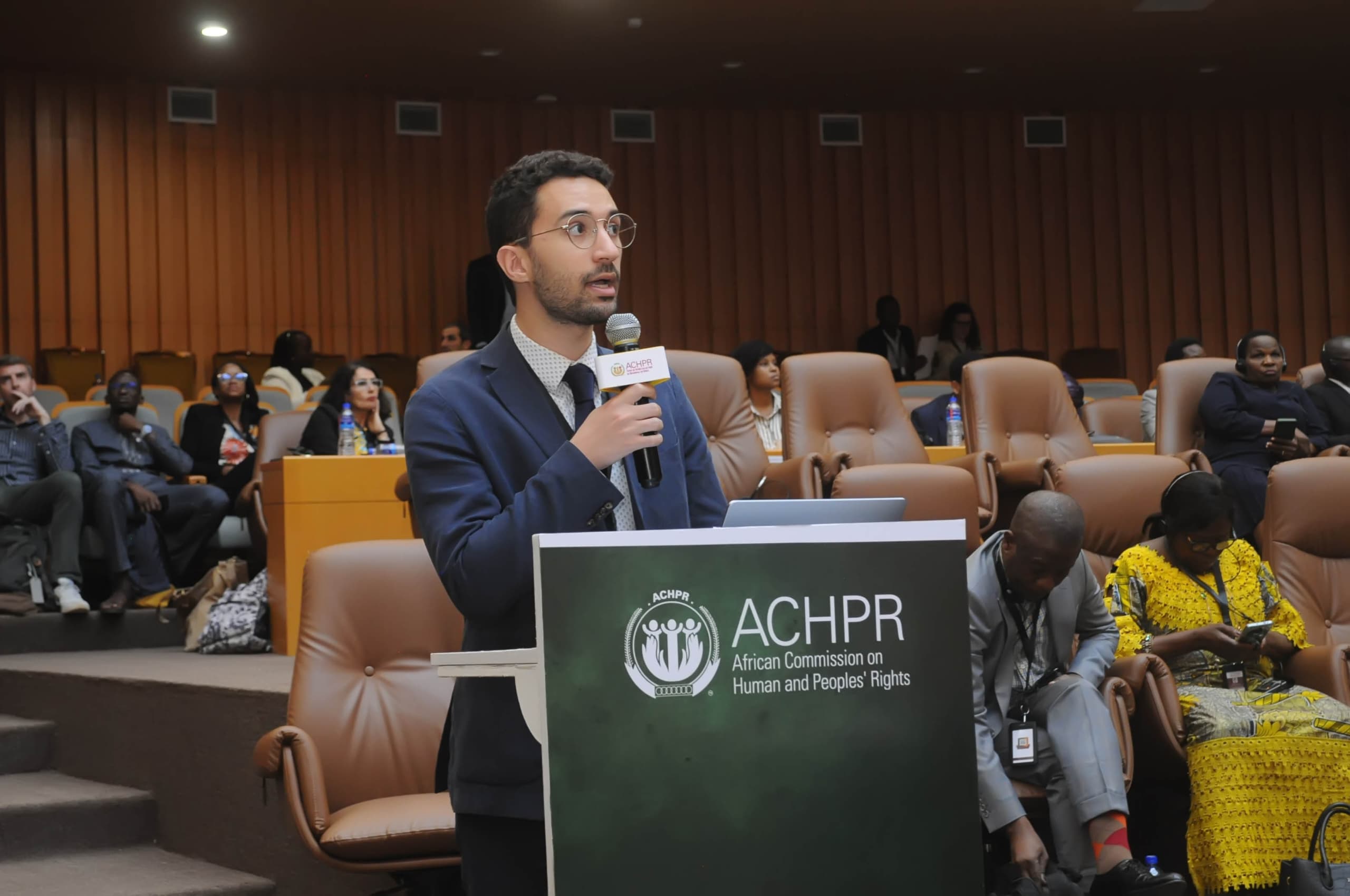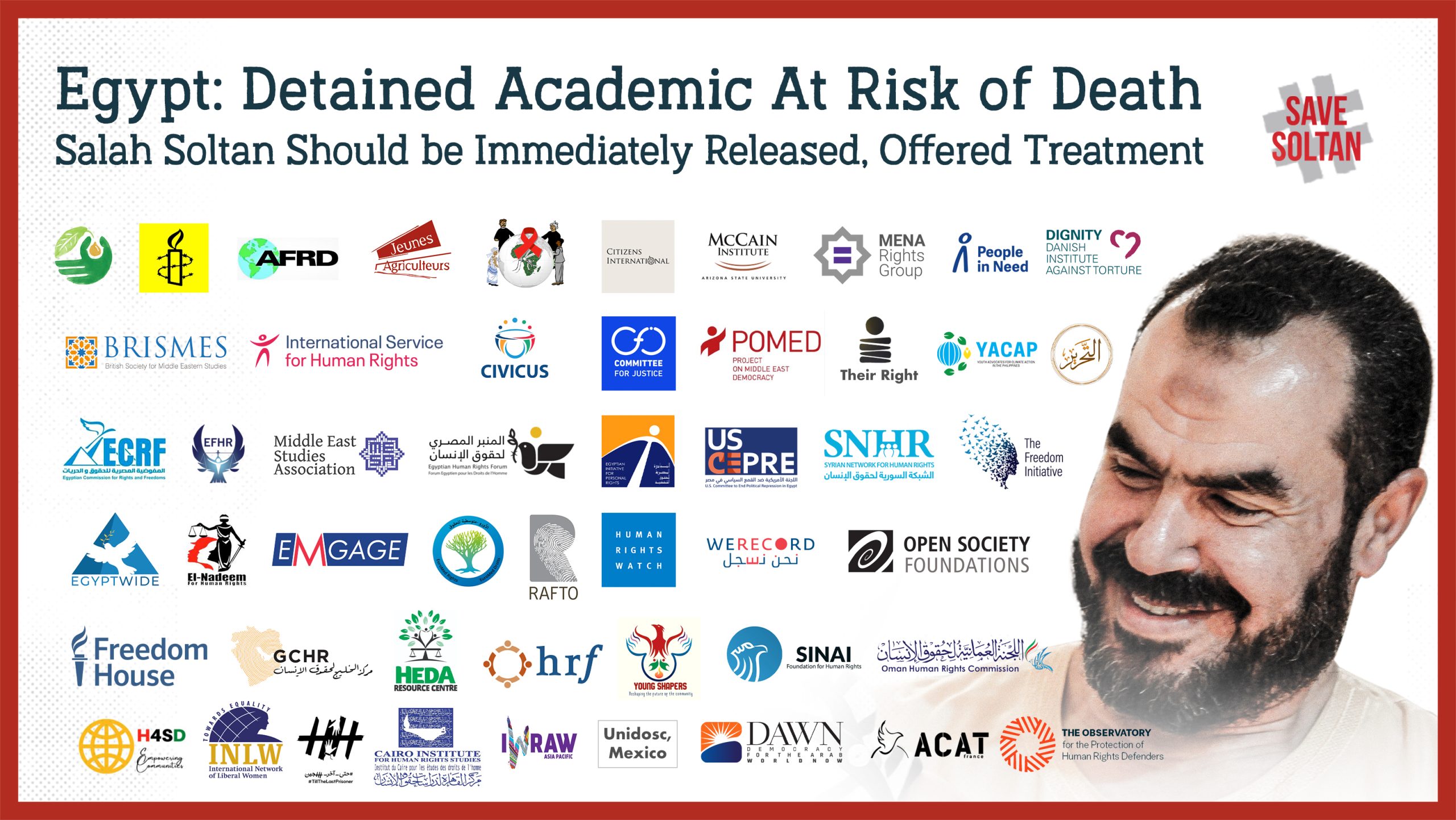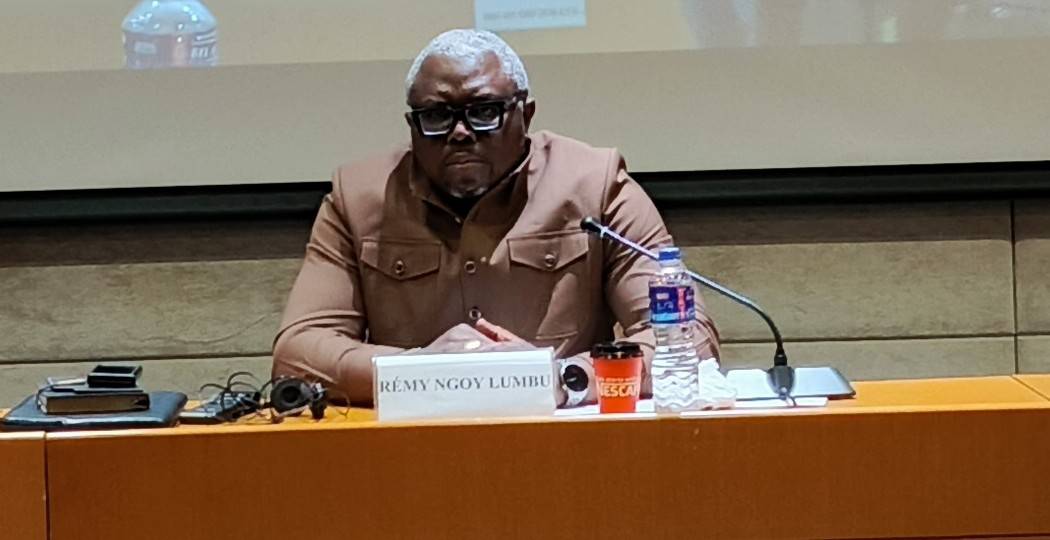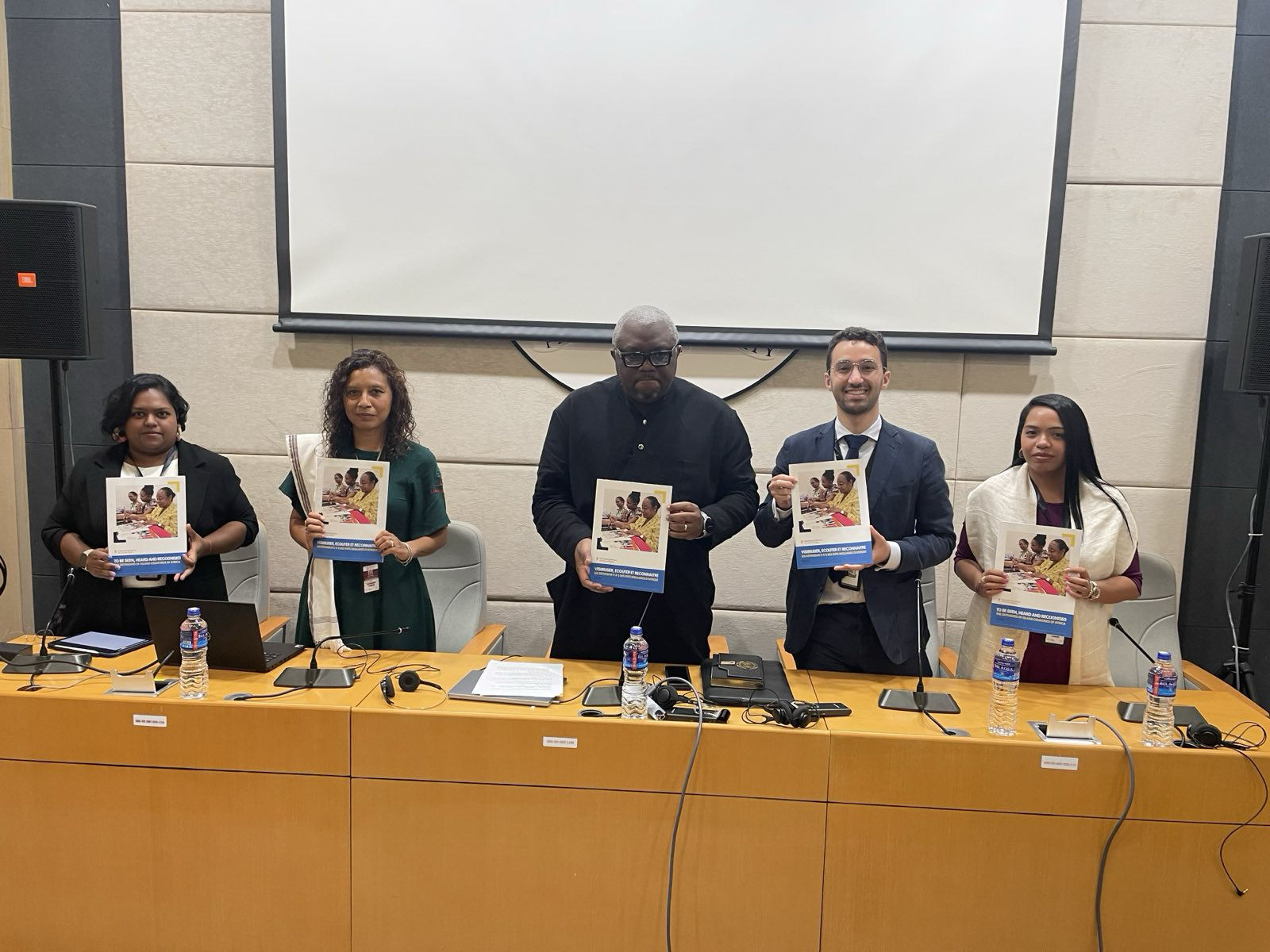Soltan, 63, said in a letter leaked on 20 March 2023 that the authorities in Badr 1 prison, East of Cairo, have deprived him of adequate healthcare even though he suffers from life-threatening heart and liver diseases among other complex medical conditions. The deliberate denial of healthcare may amount to torture. Independent doctors said in letters addressing the Biden administration, which the family shared with rights groups, that they fear Soltan is at “increased risk of sudden death” a decade after his initial arbitrary arrest and subsequent unfair conviction on politicised charges.
“On top of railroading him in an unfair trial, Egyptian authorities are deliberately abusing Salah Soltan’s rights by failing to provide him with health care.” said Adam Coogle, deputy Middle East and North Africa director at Human Rights Watch. “The authorities should at minimum transfer him to a qualified medical facility where independent health professionals can treat him without hindrance.”
Before moving to the United States, Soltan was a professor of Islamic Law at Cairo University. He later founded and served as the president of the Islamic American University in Dearborn, Michigan from 1999 to 2004. As a legal US permanent resident, Soltan lived and worked in the USA for over a decade before his arrest in Egypt in September 2013 for opposing the military’s ousting of elected president Mohamed Morsi. A court sentenced Soltan to life in prison in September 2017 in a mass trial marred by extensive due process and fair trial violations. The United Nations Working Group on Arbitrary Detention determined in 2018 that his arrest was arbitrary, as the authorities failed to provide credible evidence of wrongdoing, and that his prosecution violated the right to political participation and freedoms of peaceful assembly and expression.
In recent years, Soltan’s family said, the authorities have not provided him sufficient healthcare for chronic and new conditions, including diabetes, high blood pressure, hepatitis C, and a spinal disc condition, among others. The authorities have held him incommunicado several times, sometimes for months, during which the family knew nothing about his health or whereabouts.
The Freedom Initiative, a DC-based human rights organisation, has documented that the authorities in Badr 1 prison intentionally denied Soltan healthcare during two incidents in which he lost consciousness and had other serious symptoms. On 18 December 2022, Soltan said during a family visit that he had suffered from extreme chest pain the previous week and had called for help multiple times, before losing consciousness.
Other prisoners heard his screams and called for help. Eight hours later, prison officials came to his cell and, again, refused to take him to a doctor despite him clearly needing medical attention, intentionally denying him healthcare, sources told Freedom Initiative. Soltan, the sources said, continued to report that he was having increasing chest pains, numbness in his extremities, and limited mobility in his fingers.
Several sources, including former detainees, said that Soltan collapsed in his cell and was immobile on another occasion, during the first half of January 2023. Other inmates were screaming for help for approximately seven hours, all to no avail. The Badr 1 prison authorities ultimately came to him in his cell, and denied him health care, refusing to move him to a prison hospital or provide him with medications.
In addition to denying him access to timely healthcare, including medical examinations, prison authorities have complete discretion over provision of his vital medications and medical devices. Soltan has reported being denied medications entirely or given pills inconsistently.
In April 2022 and January 2023, 20 US-based medical professionals and specialists sent private letters to the Biden administration —and shared them with rights groups and Egyptian officials — detailing Soltan’s medical condition and the risks posed to his life by the continued denial of healthcare. In the letter, doctors assessed Soltan’s condition based on his US medical history and documents and the scant information available during his detention.
Doctors said that Soltan is most likely suffering from coronary heart disease, poorly controlled hypertension, and kidney stones, and that his diabetes lacks “objective assessment of glycemic control.” They said that Soltan is “at imminent risk of developing significant complications, including cardiac events – (heart attacks, strokes, heart failure, liver fibrosis/cirrhosis, irreversible neurological damage, and increased risk of sudden death).”
Soltan’s deteriorating health condition and the continued denial of healthcare by prison authorities is particularly concerning given reports that at least five prisoners have died in custody in Badr prison complex since June 2022 – when the authorities began transferring prisoners there – where authorities have held Soltan in a solitary cell since September 2022. Local Egyptian media recently reported that several inmates have attempted suicide in Badr prison complex based on leaked letters by prisoners about inhumane detention conditions.
A 20 March statement by more than 30 human rights organisations shed light on serious allegations of denial of healthcare and other abusive conditions of detention at Badr prison complex. The abuses include 24/7 surveillance of cells with CCTV cameras, exposure to florescent lighting around the clock, and chaining prisoners to the walls of their cells without food and water for days at a time.
The co-signing organisations believe that the authorities’ abuse of Soltan appears to be in retaliation for the human rights work of his son, Mohamed Soltan, who lives in the USA. The authorities’ retaliation has included detention of other family members, and direct threats and harassment in the US.
The Egyptian authorities have recently embarked on a public relations campaign, asserting that prison conditions in Egypt have improved, while deliberately leaving inmates with serious medical issues to suffer in prison, in some cases leading to death. In November 2019, following the unexpected death of former President Mohamed Morsi in abusive detention, United Nations experts wrote that due to Egypt’s detention conditions, “thousands more detainees across Egypt may be suffering gross violations of their human rights, many of whom may be at high risk of death.”
In recent years the Egyptian government has deployed lobbyists to cite decades old problematic remarks by Salah Soltan to dissuade policymakers from advocating for his release, but his detention and trial in Egypt are unrelated to these remarks and solely based on his peaceful political affiliation.
In recent years, the US Congress has routinely listed Salah Soltan, along with other prisoners, in the Explanatory Statements of its annual appropriations bills as a case for the secretary of state to “consider” in determining whether to certify that the Egyptian government has met specific human rights benchmarks. The statements also urged “that humane treatment and fair trials be afforded to [those specific names listed] and other prisoners in Egypt.” Additionally, on the campaign trail, then-candidate Joe Biden condemned Egypt’s exile of Mohamed Soltan and the threats to his family as “unacceptable.”
The right to life is non-derogable—that is, a right that cannot be suspended under any circumstances, including in times of emergencies or war —and inherent to everyone, including those in custody. The Human Rights Committee, which interprets the International Covenant for Civil and Political Rights, has said that the right to life “should not be interpreted narrowly”.
It also said that the deprivation of life involves “intentional or otherwise foreseeable and preventable life-terminating harm or injury, caused by an act or omission.” The obligations of States to protect lives “extends to reasonably foreseeable threats and life-threatening situations that can result in loss of life.” In this context, the organisations said, if Soltan dies in prison due to the systemic denial of health care and sustained ill-treatment, the authorities would be directly responsible for the arbitrary deprivation of his right to life. According to the UN Special Rapporteur on extrajudicial, summary, or arbitrary executions, “violations of the right to life stem not only from an intentional act of deprivation of life (murder) by the State…, but also from State’s negligence in providing basic conditions and services that guarantee life, such as access to food, water, health services and housing.”
The USA should urge Egypt to release Salah Soltan immediately, and to seek urgent treatment for his health conditions.
“The Biden administration has prioritised efforts to bring home Americans who have been wrongfully detained abroad, and it is long past time for Salah Soltan to be reunited with his family in the USA” said Allison McManus, the Freedom Initiative’s Managing Director. “As long as Soltan remains behind bars, his American family cannot feel truly safe and secure. The USA should not only stand up for Soltan’s rights, but it should also protect the rights of his family.”
Signatories:
- ACAT-France
- African Centre for Biodiversity
- Amnesty International
- Association for Farmers Rights Defense, AFRD Georgia
- ASSOCIATION JEUNES AGRICULTEURS
- British Society for Middle Eastern Studies (BRISMES)
- CAFAGB
- Cairo Institute for Human Rights Studies (CIHRS)
- Citizens International
- CIVICUS
- Committee for Justice (CFJ)
- Democracy for the Arab World Now (DAWN)
- DIGNITY, Danish Institute Against Torture
- Egyptian Commission for Rights and Freedoms
- Egyptian Front for Human Rights (EFHR)
- Egyptian Human Rights Forum ( EHRF)
- Egyptian Initiative for Personal Rights (EIPR)
- EgyptWide for Human Rights
- El Nadeem Center
- Emgage
- EuroMed Rights
- Freedom House
- Gulf Center for Human Rights
- HEDA Resource Centre
- Human Rights First
- Human Rights Watch
- Humanity for Sustainable Development
- International Federation for Human Rights (FIDH), in the framework of the Observatory for the Protection of Human Rights Defenders
- International Network of Liberal Women (INLW)
- International Service for Human Rights (ISHR)
- International Women’s Rights Action Watch Asia Pacific (IWRAW AP)
- MENA Rights Group
- Middle East Studies Association of North America (MESA)
- Omani Human Rights Association
- Open Society Foundation
- People in Need
- Project on Middle East Democracy (POMED)
- Sinai Foundation for Human Rights (SFHR)
- Syrian Network for Human Rights (SNHR)
- Tahrir Institute for Middle East Policy (TIMEP)
- The Freedom Initiative
- The McCain Institute
- The Rafto Foundation for Human Rights
- Their Right
- Till The Last Prisoner Campaign
- UnidOSC, Mexico
- US Committee to End Political Repression in Egypt
- WeRecord
- World Organisation Against Torture (OMCT), in the framework of the Observatory for the Protection of Human Rights Defenders
- Young Shapers
- Youth Advocates for Climate Action Philippines
Download as PDF




